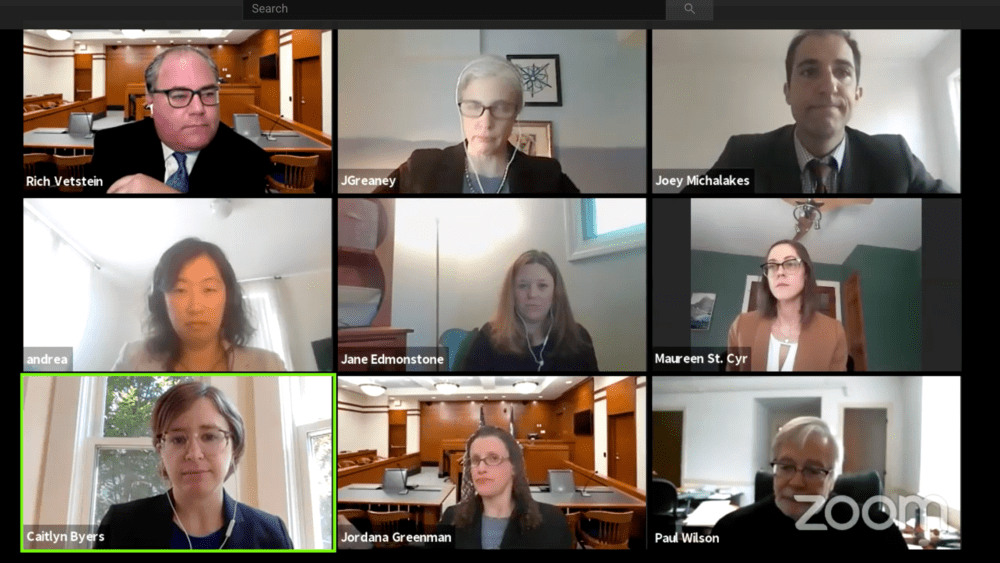Advertisement
4 Arguments And Rebuttals In The Case Challenging Mass.' Evictions Moratorium

Superior Court Judge Paul Wilson heard arguments Thursday in a suit filed by two landlords to end the ban on evictions that was put in place to relieve renters struggling from the economic fallout of the coronavirus pandemic.
The two plaintiffs are seeking an injunction to reopen housing courts to evictions, arguing landlords will suffer "irreparable harm" if the moratorium is not halted. On July 21, the moratorium was extended to mid-October.
The state case is paired with a parallel federal suit citing separate claims against the moratorium.
Arguing for the plaintiffs was real estate attorney Richard Vetstein, and for the defendants, Assistant Attorney General Jennifer Greaney and tenant advocate and attorney Joey Michalakes.
Here are four takeaways from the hearing:
Lawyers Argue About Whether There Will Be A 'Tsunami Of Evictions'
Vetstein tried to undermine the rationale behind the moratorium, presented by legislators as a necessary public health measure.
The moratorium "goes too far in addressing the perceived [problem] … that there's going to be a tsunami of evictions, which is then going to lead to homelessness, which is then going to lead to COVID-19 spread,” Vetstein said. "It's like three levels of logical leaps that you have to go through.”
In response, Michalakes, who works with the advocacy group City Life/Vida Urbana, said that an increase in evictions would most likely result in a spread of the virus.
"Your honor, there are 5,000 pending cases right now in the housing court," he said. ... Taking into account those cases alone, it's extremely likely that lifting the moratorium ... would lead to a non-trivial increase in homelessness — and that's going to spread the disease."
Lawyers Disagree About Whether Policy Results In 'Taking' Of Landlords' Property
Vetstein argued the moratorium effectively creates a situation where tenants do not have to pay rent.
"They are allowed effectively to live in the property and … to possess that property against the owners,” he said.
Because the policy comes from the state, the plaintiffs argued it's the state's responsibility to compensate landlords for lost revenue.
Greaney rejected the "taking" argument, saying the landlords are wrong about what constitutes taking under the law.
“They are talking about their ability or inability to recover the income stream from one unit in the property,” she said. "Taking is about value of the parcel as a whole — the land and the buildings they're on."
Views Differ On Landlords' Right To Access The Courts
Vetstein argued landlords have a constitutional right to file a lawsuit with respect to their property, and said the moratorium violates that right, "especially where, as here, you have tenants who in many cases are not paying rent, either [through] their own fault or through COVID.”
"But you are literally forcing landlords across the state to… provide public housing to tenants because of this moratorium,” he added.
Greaney rebutted that nothing under the moratorium stops landlords from defending their rights under a lease agreement.
"The only thing that has happened is that the Legislature has delayed the remedy of possession and that it certainly has the right to do [so] without violating the right of access to the courts,” she said.
Arguments About A Potential Violation Of The Separation Of Powers
Vetstein said the moratorium is a first in the history of Massachusetts. And, he added, the law micromanages how a housing court judge handles his or her own case docket.
"It says you cannot even schedule a court event,” he said. "It doesn't define what a court event is. Ostensibly, that would be, the court can't schedule a pretrial conference, can't schedule a mediation, can't schedule a motion hearing, can't do anything. No trials can be scheduled — both bench and jury trials."
Greaney said it's clear the Legislature can set certain procedural requirements for the courts.
"There certainly has been no interference with the judgments [of the courts]," she said. ... They're simply frozen in time with a ... provision in the statute that makes clear that no landlord's rights are going to be lost."
